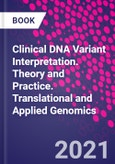Clinical DNA Variant Interpretation: Theory and Practice, a new volume in the Translational and Applied Genomics series, covers foundational aspects, modes of analysis, technology, disease and disorder specific case studies, and clinical integration. This book provides a deep theoretical background, as well as applied case studies and methodology, enabling researchers, clinicians and healthcare providers to effectively classify DNA variants associated with disease and patient phenotypes. Practical chapters discuss genomic variant interpretation, terminology and nomenclature, international consensus guidelines, population allele frequency, functional evidence transcripts for RNA, proteins, and enzymes, somatic mutations, somatic profiling, and much more.
Please Note: This is an On Demand product, delivery may take up to 11 working days after payment has been received.
Table of Contents
1. Introduction: The challenge of genomic DNA interpretation
Section I. Theoretical Chapters
2. General considerations: Terminology and standards
3. International consensus guidelines for constitutional sequence variant interpretation
4. Quantitative modelling: Multifactorial integration of data
5. Clinical and genetic evidence and population evidence
6. The computational approach to variant interpretation: principles, results, and applicability
7. Functional evidence (I) transcripts and RNA splicing outline
8. Functional evidence (II) protein and enzyme function
9. Somatic data usage for classification of germline variants
10. Pharmacogenomics and personalized medicine
11. Data sharing and gene variant databases
12. Approaches to the comprehensive interpretation of genome-scale sequencing
13. Phenotype evaluation and clinical context: Application of case-level data in genomic variant interpretation
Section II. Practical Chapters
14. Inherited cardiomyopathies
15. Phenylketonuria
16. Hearing loss
17. Familial hypercholesterolemia
18. Classification of genetic variants in hereditary cancer genes
19. RASopathies
20. Summary and conclusions








